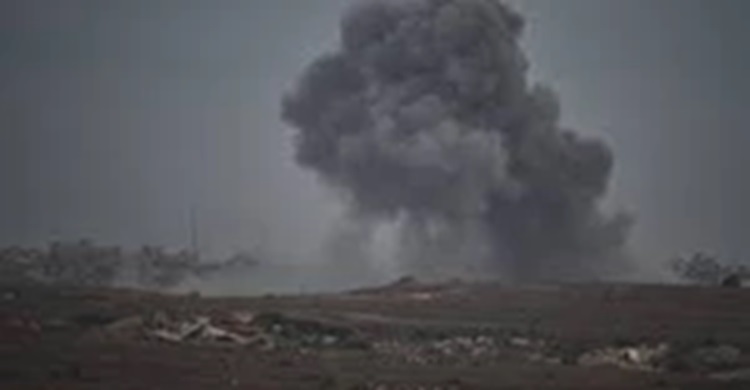Israel and Hamas begin indirect peace talks in Egypt


On the eve of the second anniversary of the Gaza war, Israeli and Hamas representatives have begun indirect negotiations at an Egyptian resort, discussing a U.S.-proposed peace initiative aimed at ending the long-standing conflict.
The talks, held over several hours on Monday in Sharm el-Sheikh, revolve around a plan introduced by U.S. President Donald Trump. Major sticking points remain, including Israel's insistence on Hamas disarming and questions about who will govern Gaza moving forward. Trump has suggested that a resolution in Gaza could set the stage for broader peace in the Middle East.
Despite Trump’s call for Israel to halt its bombing campaign, Israeli airstrikes continued in Gaza, reportedly killing at least 19 people in the past day, according to Gaza’s Health Ministry.
An Egyptian official familiar with the discussions said Monday's session concluded with plans to resume on Tuesday. He noted that both sides had reached preliminary agreement on the first stage of the deal — which involves a ceasefire and the release of hostages.
Israel's team is led by senior negotiator Ron Dermer, with adviser Ophir Falk also attending. Hamas is represented by senior official Khalil al-Hayyah. According to Egypt’s state-run Al-Qahera News, the process began with Hamas meeting Arab mediators, who later met with the Israeli delegation.
U.S. figures including envoy Steve Witkoff and Trump’s son-in-law Jared Kushner are also expected to join the negotiations, Egyptian media reported.
Hamas stated that talks will address an initial ceasefire phase involving a partial Israeli withdrawal and an exchange of hostages for Palestinian prisoners held in Israeli jails.
This peace initiative gained momentum after both Israel and Hamas expressed conditional support for elements of the U.S. plan. Under its terms, Hamas would release the remaining 48 hostages—around 20 of whom are thought to be alive—within three days, disarm, and relinquish control of Gaza.
Israeli Prime Minister Benjamin Netanyahu said the discussions should last only a few days, though Hamas leaders warned more time may be needed to recover the remains of some hostages trapped under rubble.
Egyptian President Abdel-Fattah el-Sisi praised Trump’s role in seeking peace, emphasizing the importance of the long-standing U.S.-led peace efforts in the region, dating back to the 1970s. He spoke during a televised address marking the anniversary of the 1973 war with Israel, which resulted in Egypt regaining the Sinai Peninsula.
U.S. Presses for Ceasefire
The U.S. has made it clear that continued Israeli airstrikes must stop to facilitate the release of hostages. While Israel says it is largely complying, its military claims ongoing strikes are defensive in nature. Nonetheless, dozens of Palestinians have reportedly been killed since Saturday night.
Gaza’s Health Ministry reported that in the last 24 hours, 19 people were killed—including two seeking aid—and 96 were injured. Since the war began on October 7, 2023, following a deadly Hamas attack, the Palestinian death toll has reached 67,160, with nearly 170,000 wounded. The ministry, part of the Hamas-led government, is considered the most reliable source for casualty data by the UN and other observers.
During the initial October 7 attack, Hamas-led militants killed around 1,200 people—mostly civilians—and kidnapped 251. Many hostages have since been released through ceasefire deals.
Meanwhile, families of the remaining Israeli hostages have nominated Trump for the Nobel Peace Prize, crediting his efforts toward ending the war and securing the hostages' release. They expressed renewed hope that peace may soon be possible.
At a memorial in Nir Oz Kibbutz for those killed on October 7, Daniel Lifshitz—whose family members were taken hostage—emphasized that the priority should be the immediate release of all captives. He acknowledged the difficult compromises Israel might make but said, “We cherish life, and in Trump we trust to make it happen.”
Gaza Families Mark Grim Anniversary
In Gaza, families of children born on the day the war began had hoped to mark their second birthdays with joy, but instead remain surrounded by violence and displacement. Many now live in dire conditions, lacking sanitation, food, and medical care.
Amal al-Taweel and her husband, Mostafa, had their son Ali after years of trying. Now, they live in a tent, far from the peaceful life they imagined for him. “He never got to experience what a safe, loving home feels like,” she said.
Vatican Calls for Proportionality
As the war's anniversary approaches, the Vatican condemned the October 7 attacks on Israel as an “inhuman massacre,” while also criticizing Israel’s extensive bombing of Gaza. It called on nations to halt arms shipments to Israel and urged respect for the principle of proportionality in warfare.
Cardinal Pietro Parolin, the Vatican’s Secretary of State, stated: “Even in legitimate defense, proportionality must be maintained. A spiral of hatred will only lead to destruction.”
